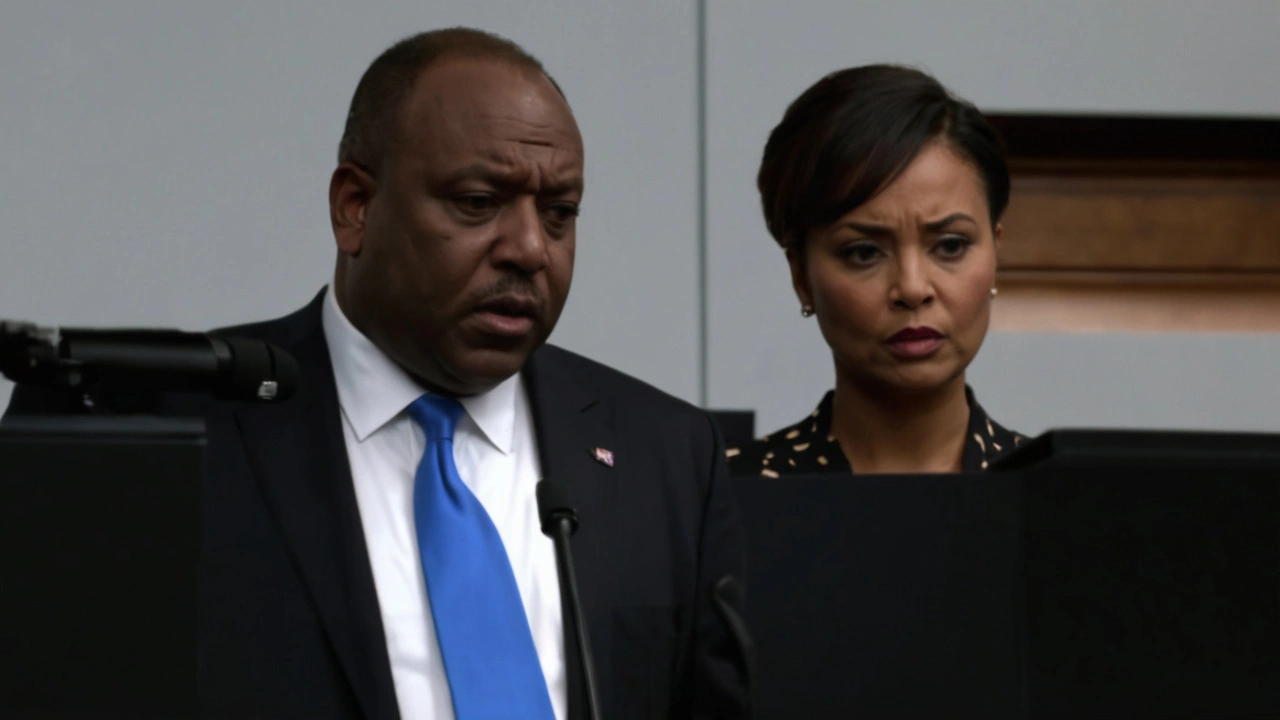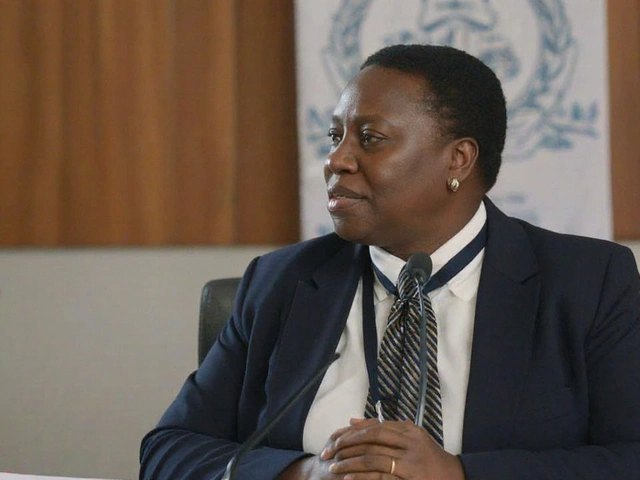DOJ Investigates Fatal Shooting of Sonya Massey
The U.S. Department of Justice has confirmed that it is currently assessing the circumstances surrounding the tragic shooting of Sonya Massey. The incident has shocked the nation and has raised serious questions about police conduct and racial justice. Sonya Massey, a 36-year-old unarmed Black woman, was fatally shot by Sangamon County Sheriff's deputy Sean Grayson on July 6. What began as a routine call to 911 about a possible prowler ended in a death that many believe was avoidable.
911 Call Leads to a Fatal Encounter
On that fateful evening, Massey dialed 911 fearing there was an intruder lurking outside her home. This kind of emergency call is all too common, but no one could have anticipated the horrific chain of events that followed. Response from the officers seemed appropriate initially, as they arrived promptly and conducted a thorough search of her residence. After determining there were no intruders, the scene took a devastating turn.
While they found no evidence of a prowler, they did give Massey the opportunity to attend to a chore in her kitchen. It was at this moment that the situation escalated. As Massey uttered the words 'I rebuke you in the name of Jesus,' Deputy Grayson reacted with what many describe as unnecessary and extreme force.
The Shocking Shooting
Deputy Sean Grayson, instead of attempting any form of de-escalation, threatened to shoot Massey. His threat wasn't empty; he fired three shots, one of which struck Massey fatally in the head. The entire episode was captured on body camera footage, providing an undeniable record of that tragic night. The footage has since sparked widespread outrage, reigniting discussions about police brutality and systemic racism within law enforcement.
Soon after the incident, Deputy Grayson was arrested and consequently fired from his position. His actions have led to a string of legal consequences, including an indictment on charges of first-degree murder. He is currently being held while he awaits trial, as many keep a close eye on the progress of the judicial proceedings.
Civil Rights Outrage
The case has drawn the attention of prominent civil rights attorney Benjamin Crump, who represents Massey's grieving family. Crump has been vocal in his condemnation of the officer’s actions, describing the video footage as 'the worst police shooting video ever.' His involvement brings a renewed spotlight on issues of police reform and accountability. The family's legal team aims to see justice served, not just for Massey, but for countless others who have suffered similar fates.
DOJ's Involvement and Public Reactions
The Department of Justice has stepped in to ensure a thorough and unbiased investigation. Their involvement signifies the gravity of the situation and the federal government's willingness to address police misconduct head-on. In a public statement, the DOJ extended their condolences to Massey's family and loved ones, acknowledging the deep pain this incident has caused. They have assured the public that they are committed to uncovering the truth and delivering justice where it is deserved.
Public reactions to the shooting have been strong and swift. Activists, community leaders, and everyday citizens have joined forces to call for systemic changes. Vigils, protests, and calls to action have emerged, demanding that law enforcement agencies across the country implement meaningful reforms to prevent such tragedies in the future. The outcry underlines an ongoing struggle for racial justice and the need for accountability within the ranks of those sworn to protect and serve.
The Broader Implications
Sonya Massey’s case is a tragic reminder of the ongoing issues that plague the nation’s law enforcement systems. Instances like these force the country to reckon with its track record on police violence against marginalized communities, especially Black Americans. It raises important questions about police training, the use of force, and the accountability mechanisms in place to prevent such abuses of power.
Calls for comprehensive police reform are growing louder. Advocates argue for better training programs focused on de-escalation techniques, mandatory usage of body cameras, and stringent screening processes for potential recruits. Beyond policy changes within police departments, there's also a push for broader societal shifts.
Educational programs aimed at fostering understanding and empathy, stronger community policing initiatives that foster trust rather than fear, and legislative changes that hold officers accountable for misconduct are seen as crucial steps forward. As the nation mourns another life lost too soon, there is an urgent need to come together and advocate for long-lasting changes that honor the memory of those like Sonya Massey.
The Way Forward
This incident is not isolated, and it's not the first to spark outrage. However, continuing to address each case with unwavering attention is necessary for real progress. Holding officers accountable, understanding the systemic issues at play, and striving for equity within the justice system are not just immediate needs but ongoing commitments. The ultimate goal is to create a society where everyone, regardless of race or background, feels safe and protected by those who serve as guardians of the law.
As we move forward, it remains crucial to keep Sonya Massey's story at the forefront of the conversations about police reform and justice. Her life, marked by the tragic events of July 6th, serves as a poignant reminder of the work that still needs to be done to ensure a justice system that truly works for all.
The DOJ’s investigation will likely take time, as thorough assessments are critical for ensuring justice. But with eyes from all corners of the nation watching closely, there is hope that this case will contribute to substantive changes in policing practices, accountability measures, and perhaps aid in preventing future tragedies like this.







6 Comments
Oh great, another ‘heroic’ cop story that proves why we need a better selection process for deputies.
While some may try to downplay this tragedy, the reality is that a single life was taken far too soon. The community’s grief is real, and we must channel that pain into decisive action. It is unacceptable that an unarmed woman had to utter a prayer before being shot; that speaks volumes about systemic failures. Let’s stand together, demand accountability, and ensure this kind of violence never repeats.
In light of the Department of Justice’s involvement, it is imperative to examine both procedural and systemic dimensions of this case. The investigation will assess the deputy’s adherence to established use‑of‑force protocols, which dictate that lethal force be a last resort. Moreover, the body‑camera footage provides an indisputable record that will be critical for any potential prosecution. The indictment for first‑degree murder underscores the gravity of the alleged misconduct and signals a commitment to holding law‑enforcement officers to the highest legal standards. Families affected by such tragedies deserve transparent, thorough, and timely updates as the case progresses. Federal oversight may also catalyze broader reforms, including mandatory de‑escalation training and stricter screening for prospective deputies. Civil‑rights attorney Benjamin Crump’s participation amplifies the national conversation on policing inequities, reminding us that individual accountability can drive systemic change. While the criminal process moves forward, the community must also focus on restorative measures that support the bereaved. Policy recommendations emerging from this incident could include expanding mental‑health crisis response teams to reduce reliance on armed officers for non‑violent calls. Additionally, establishing independent oversight boards may increase public trust in local law‑enforcement agencies. The confluence of legal scrutiny, civil‑rights advocacy, and public outcry creates a pivotal moment for reform. It is essential that stakeholders seize this opportunity to implement lasting, evidence‑based policies that prioritize human life and dignity above all else. Ultimately, the hope is that Sonya Massey’s memory will serve as a catalyst for a safer, more equitable justice system.
This tragedy forces us to confront the philosophical underpinnings of policing in a democratic society. When the state’s agents resort to lethal force without provocation, we must question the moral contract that legitimizes their authority. The aggressive tone of the deputy’s actions betrays a deeper cultural narrative that equates Blackness with threat. A reconceptualization of community safety-one rooted in empathy and mutual respect-cannot be delayed any longer. Let us demand that policy reflect the shared values of humanity and justice.
So heartbreaking to read about Sonya’s story 😢. We must keep her spirit alive and push for real change 🙏.
From an empathetic listening standpoint, the emotional resonance of this incident extends beyond the immediate community, permeating the national discourse on law‑enforcement accountability. The procedural intricacies of the DOJ’s investigative framework, combined with the jurisprudential implications of a first‑degree murder charge against a deputy, warrant a nuanced, interdisciplinary analysis. It is essential to contextualize the micro‑level human impact within macro‑level systemic patterns, thereby fostering a comprehensive understanding that can inform policy remediation. While the jargon‑laden discourse may appear opaque, it serves to delineate the precise legal standards and evidentiary thresholds at play. Ultimately, a collaborative, data‑driven approach, anchored in both empathy and rigorous scholarship, will be pivotal in transforming this tragic narrative into a catalyst for substantive reform.